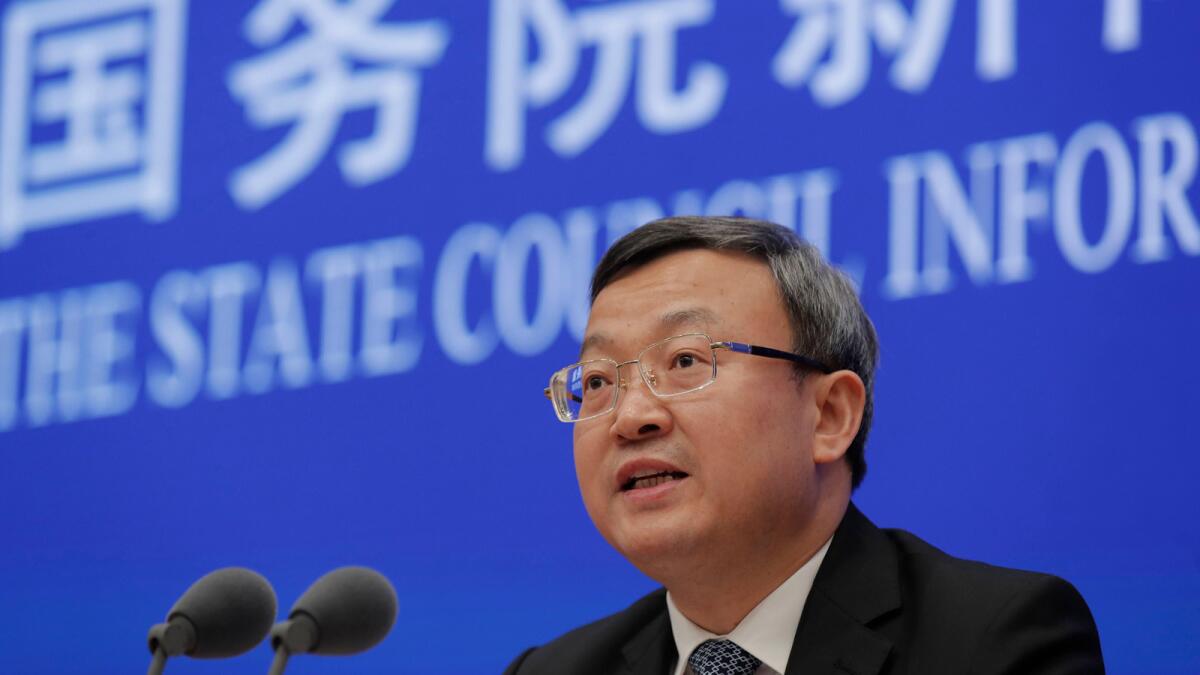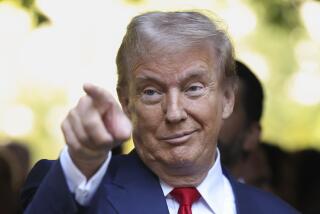China blames U.S. for trade war escalation and calls its own measures ‘necessary’

Reporting from Beijing — China’s State Council issued an 8,300-word white paper Sunday morning blaming the U.S. government for trade war escalation and expressing the desire for continued talks.
Vice Minister of Commerce Wang Shouwen said at a rare press conference that the goal of trade negotiations should be a cancellation of tariffs on both sides, but that talks must proceed on a basis of equality, dignity, and mutual benefit.
The U.S. should take “full responsibility” for instigating and accelerating the trade war, added Guo Weimin, vice minister of the State Council Information Office. China’s measures have been “necessary” and “reactive,” he said.
“China doesn’t want to fight, is not afraid of fighting, but will fight if it has no choice. This attitude has never changed,” Guo said.
China’s white paper comes amid a series of rapid escalations in the U.S.-China trade war. Last month, the U.S. increased tariffs on $250 billion of Chinese products. China raised retaliatory tariffs on $60 billion of U.S. goods.
Trump administration officials said last month that Chinese negotiators had backtracked on a draft version of the trade agreement, removing all parts requiring changes to Chinese law.
Wang said discussions before an official agreement did not constitute backtracking.
“Nothing is agreed until everything is agreed,” he said.
For the U.S. and China, it’s not a trade war anymore — it’s something worse »
Wang also said the U.S. had made “unreasonable demands” in the proposed deal that threatened Chinese sovereignty.
“If one side doesn’t respect the other’s sovereignty and wants to pressure the other to give in and then take one-sided benefit, this kind of negotiation cannot succeed,” Wang said.
Analysts say the conflict comes down to the Chinese refusal to accept wording that appears to give U.S. control over Chinese laws. But U.S. negotiators don’t want to make a deal with no enforcement mechanism.
U.S.-China trade relations are particularly on edge in the tech world. The Trump administration banned business with Huawei, China’s largest telecom company, on May 15.
The U.S. government says Huawei is a national security threat because of the Chinese government’s potential ability to spy on users of Huawei equipment through telecom networks.
Huawei has repeatedly denied having ties with the Chinese government.
On Friday, China’s Ministry of Commerce announced it would create a list of “unreliable” entities, foreign companies that may pose a threat to national security or damage the interests of domestic companies by operating according to “non-commercial motives.”
China is making the blacklist “to protect international economic and trade rules and the multilateral trading system, to oppose unilateralism and trade protectionism, and to safeguard China’s national security, social and public interests,” said Commerce Ministry spokesperson Gao Feng.
China has not yet announced what companies are on the list or what measures it would take against them.
But major U.S. companies like Apple, Google, Qualcomm and Intel could all be threatened, as well as non-American companies like Samsung and Toshiba.
On Saturday, state news agency Xinhua reported that China was investigating FedEx for “undermining the legitimate rights and interests of Chinese clients.”
The delivery company diverted packages of paperwork sent by Huawei to FedEx headquarters in Memphis, Tenn., instead of to Huawei offices in Asia.
FedEx actions were “seriously damaging the lawful rights and interests of its clients and violating laws and regulations governing the express industry in China,” the Xinhua report said.
FedEx apologized on Chinese social media, saying the rerouting was a mistake and that “no outside party requested FedEx to reroute those packages.”
Wang said that foreign companies should operate by Chinese law when working in China.
“We welcome foreign investors to do legal business in China. But if they break the law, then we must investigate them according to Chinese law,” he said. “They must respect Chinese law and work within its framework.”
Foreign companies have meanwhile complained that China’s business environment is unfair, tilted by government support for state-owned companies and tolerance of domestic companies’ theft of intellectual property from foreign partners and investors.
China recently passed a new foreign investment law meant to equalize treatment of foreign and domestic companies in China, but foreign businesses and lawyers complain that the wording is too vague to be effective.
Wang also reiterated recent warnings made by an official from China’s planning ministry that China could restrict exports of rare earths.
“We are willing to satisfy other countries’ normal demands for rare earth. But if a country uses Chinese rare earth to make products that are then obstructing Chinese development, this is of course hard to accept,” Wang said.
Rare earths are minerals used in a wide range of technological products including smartphones, wind turbines, electric cars and advanced precision weapons.
China currently contains a third of the world’s rare earth supplies but provides 80% of the United States’ rare earth imports, according to U.S. Geological Survey data.
China has invested heavily in rare earth processing, while the U.S. has no rare earth processing plants in operation.
The only rare earth mine in the U.S. is in Mountain Pass, Calif., and it ships its mined rare earth to China for processing.
The U.S. has excluded Chinese rare earth imports from recent tariffs, but China has raised tariffs on imports of U.S. rare earth metal ores to 25%.
During the press conference, Wang also disputed the Trump administration’s claims that the U.S.-China trade imbalance is unfair.
“You can’t say one side is winning or losing because there is a deficit,” Wang said, adding that the U.S. has a goods deficit but a services surplus with China.
He said that much of Chinese manufacturing is assembly of components that China first imports from elsewhere, and that U.S.-China trade deficit numbers don’t reflect the costs China pays in other parts of the supply chain.
Tariffs are an ineffective form of pressure that will not make China back down and will harm American farmers, workers, and consumers as well as the global economy, Wang said.
“This doesn’t just hurt China. It will also hurt the U.S. and will damage the whole world’s economic development,” he said.
From cars to avocados, consumers could pay the price for Trump’s Mexico tariffs »
Will Huawei’s loss be Samsung’s gain in the China-U.S. trade war? »
Trump’s Huawei ban — and the risk of retaliation — threatens the global tech industry »
More to Read
Sign up for Essential California
The most important California stories and recommendations in your inbox every morning.
You may occasionally receive promotional content from the Los Angeles Times.











